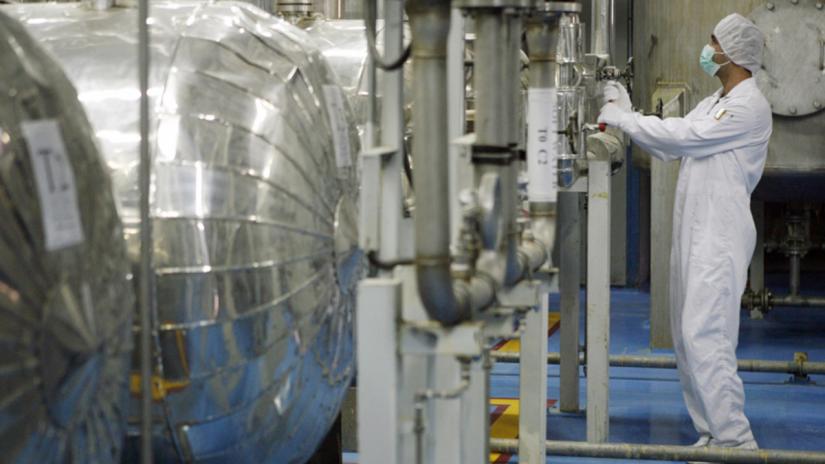 The Europeans are trying to maintain a very careful balance about not only coming across as naïve on the nuclear issue as far as the Trump’s White House is positioned but also ensuring that they don’t push Iran into an even tighter corner than it is in already under the U.S. sanctions pressure. Now, what we’ve seen from Iran at the moment is a very managed and calculated escalation on the question of violating a critical provision of the nuclear deal, which seen from the European side, doesn’t seem to have crossed their red lines. We’re not sure what the red lines are at the moment. But, clearly what we’ve seen is very small incremental tweaking of these nuclear commitments which again are quite low in the spectrum of nuclear activity. They can be reversed and managed if adequate diplomatic efforts are made in the next few weeks and months.
The Europeans are trying to maintain a very careful balance about not only coming across as naïve on the nuclear issue as far as the Trump’s White House is positioned but also ensuring that they don’t push Iran into an even tighter corner than it is in already under the U.S. sanctions pressure. Now, what we’ve seen from Iran at the moment is a very managed and calculated escalation on the question of violating a critical provision of the nuclear deal, which seen from the European side, doesn’t seem to have crossed their red lines. We’re not sure what the red lines are at the moment. But, clearly what we’ve seen is very small incremental tweaking of these nuclear commitments which again are quite low in the spectrum of nuclear activity. They can be reversed and managed if adequate diplomatic efforts are made in the next few weeks and months.
It appears from the European side particularly, the French initiative is to try and buy some time for a diplomatic pathway with Tehran in the run-up to the UN General Assembly session in September. The broad idea is to stop the escalation both from American side on pilling on greater sanctions and from the Iranian side on withdrawing from its compliance of nuclear treaty provisions.
Presumably, one of the things we might see from the European side in the Summer days is a greater outreach to the White House to see if they create some flexibility and breathing room as far as Iran’s exports are concerned. This is a very critical issue for Tehran if it is to stay compliant with this deal.
One needs to understand that the other element where the Europeans are really focused on diplomatically and technically: is trying to really launch this mechanism for trade with Iran. Unfortunately, there have been some problems with it but we’re hoping that this is going be imminently facilitating certain transactions and trade between European companies and Iranian companies just to show something tangible for Iran on the table for sticking to this deal.
So far, over the past year, there was an experimental phase for European governments and their companies to analyse: what is the impact of U.S. unilateral sanctions on their economy?
Meanwhile, a year on now, we see that it is extensive, vast and probably greater than anyone had predicted earlier in Europe. Unfortunately, the way the economies are intertwined at the moment makes it relatively easy for the U.S. to weaponise its sanctions against European governments and their companies. Now, what we’re seeing are very first elemental steps towards a longer-term roadmap for the response to this economic assault that we’ve seen from the United States.
It would be important to note that for Iran, it doesn’t seem that Europe either has the capacity or the political willingness to circumvent or undermine U.S.'S secondary sanctions. It’s very clear that at least in the initial phase progress is going to be restricted to facilitating humanitarian trade with Iran. It’s going to probably get a credit line from certain EU governments. Only perhaps at a later stage, Iran will be able to connect with other economies like India or Japan or China. But, for now, the idea is to keep its ambitions limited to be able to get this mechanism going to prevent it from being shot down by the White House or the U.S. Treasury. This is the assurance from Europe to Iran. Now, it is for both sides to decide whether enough common ground has been achieved or not. Europe doesn’t right now have the capacity to deliver on the economic side to Iran. And, really the escalation we’re seeing on the nuclear issue or other aspects in the region is to try and create leverage for possible negotiations directly with the United States.
Europe doesn’t right now have the capacity to deliver on the economic side to Iran. And, really the escalation we’re seeing on the nuclear issue or other aspects in the region is to try and create leverage for possible negotiations directly with the United States.
Given this current trajectory, one observation needs to be made. The world saw British Marines board and seize an Iranian tanker off the coast of Gibraltar recently. Is that an example of Europe giving in to U.S. pressure?
It seems to have sparked a discussion internally within the EU as well in terms of European Union sanctions framework. There’s now a spat between the Spanish government and the UK government about authority to carry out this activity. And, there’s also a perception within Iran that this operation was conducted at the behest of the White House.
Now, it would be interesting to see if Iran indeed actually takes up a legal challenge for the release of the tanker targeting the UK. There are many questions as to whether this activity was actually legal under the EU sanctions framework. But, that’s the question to be worked out. What we’re seeing now is that the firewall that was put in place between the nuclear deal and other contentious issues between Iran and Europe for the last four years is starting to deteriorate.
And, the more escalation we’re seeing on one area is going to have an impact on the nuclear deal and relations between the Europeans and the Iranians. It will be important to see if both the UK and Iran in this situation can come up with a diplomatic route out of this. Cooler heads are needed to prevent this from escalating further because at the end of the day the UK is a critical party to this nuclear deal.
Md. Sharif Hasan teaches International Relations at University of Rajshahi.
 Opinion
Opinion
30682 hour(s) 13 minute(s) ago ;
Morning 05:07 ; Wednesday ; Apr 17, 2024
Europe must re-examine how to save Iran deal?
Send
Md Sharif Hasan
Published : 21:00, Jul 10, 2019 | Updated : 21:05, Jul 10, 2019
Published : 21:00, Jul 10, 2019 | Updated : 21:05, Jul 10, 2019
0 ...0 ...
/aib/hb/
Topics: Top Stories
***The opinions, beliefs and viewpoints expressed in this article are those of the author and do not reflect the opinions and views of Bangla Tribune.
- KOICA donates medical supplies to BSMMU
- 5 more flights to take back British nationals to London
- Covid19: Rajarbagh, Mohammadpur worst affected
- Momen joins UN solidarity song over COVID-19 combat
- Covid-19: OIC to hold special meeting
- WFP begins food distribution in Cox’s Bazar
- WFP begins food distribution in Cox’s Bazar
- 290 return home to Australia
- Third charter flight for US citizens to return home
- Dhaka proposes to postpone D8 Summit
Unauthorized use of news, image, information, etc published by Bangla Tribune is punishable by copyright law. Appropriate legal steps will be taken by the management against any person or body that infringes those laws.
Bangla Tribune is one of the most revered online newspapers in Bangladesh, due to its reputation of neutral coverage and incisive analysis.
F R Tower, 8/C Panthapath, Shukrabad, Dhaka-1207 | Phone: 58151324; 58151326, Fax: 58151329 | Mob: 01730794527, 01730794528


